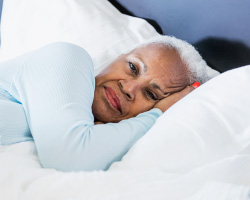
May 18, 2023—Changing hormones during the menopause transition can make a good night's sleep feel like an impossible dream. But there are steps you can take that can help you get enough rest.
Sleep problems are common during menopause
Menopause is a normal part of life, not a disease. But the transition can cause troublesome symptoms. One of the most common? Trouble sleeping.
According to the Office on Women's Health, there are a few reasons for that:
- Declining levels of the hormone progesterone can make it difficult to fall asleep.
- Lower levels of estrogen can lead to hot flashes—sudden feelings of heat in the upper body that can make a person wake up sweaty.
- Bladder and urinary issues become more frequent and might wake a person up in the middle of the night to use the restroom. Of course, it can be difficult to get back to sleep after waking in the night.
Trouble sleeping is a problem because restful sleep is essential for good health, according to the Centers for Disease Control and Prevention. Getting enough sleep helps reduce the risk of injuries and chronic health conditions, such as type 2 diabetes and heart disease. Luckily, there are steps you can take to sleep easier.
8 ways to sleep better through menopause
- Limit caffeine. Caffeine is known for making you more alert, which interrupts sleep. It can also lead to nighttime trips to the restroom, so switch to caffeine-free drinks after noon.
- Set up your bedroom for sleep. To help promote healthy sleep, keep your room a comfortable temperature. And try to make it a dark, quiet and screen-free space.
- Stick to a sleep schedule. Going to bed and waking up at the same time helps train your brain to recognize when it's time to sleep.
- Talk about bladder issues. If your bladder wakes you up at night, ask your healthcare provider about medical devices or treatments that can help.
- Exercise. Regular physical activity can help you feel tired at night. If you can, schedule your workout early in the day. Activity close to bedtime can energize you.
- Tame hot flashes. A glass of water, a fan and layers of bedding can help cool you down. If hot flashes persist, your healthcare provider might recommend hormone therapy or medication.
- Do something boring. If you wake up and struggle to get back to sleep, get out of bed until you feel sleepy. Reading something boring, like your home insurance policy documents, might do the trick.
- Address your mood. Look for healthy outlets for the stress, anxiety and depression that can increase around menopause and have you lying awake at night. Your healthcare provider might be able to offer medication and other resources.
Still counting sheep? You don't have to resign yourself to sleeping in two-hour blocks while going through menopause. Let your healthcare provider know if you have trouble sleeping. Some menopause-related sleep issues can be treated with medication or lifestyle changes.
More tips for easing menopause
You don't have to go through menopause alone. Explore guides to managing common menopause complaints and solving sleep issues in our health topic centers.
Sources
- American Academy of Sleep Medicine. "Healthy Sleep Habits." https://sleepeducation.org/healthy-sleep/healthy-sleep-habits.
- American College of Obstetrics and Gynecology. "Sleep Health and Disorders." https://www.acog.org/womens-health/faqs/sleep-health-and-disorders.
- Centers for Disease Control and Prevention. "Sleep and Sleep Disorders." https://www.cdc.gov/sleep/index.html.
- National Institute on Aging. "A Good Night's Sleep." https://www.nia.nih.gov/health/good-nights-sleep.
- National Institute on Aging. "Sleep Problems and Menopause: What Can I Do?" https://www.nia.nih.gov/health/sleep-problems-and-menopause-what-can-i-do.
- North American Menopause Society. "Sleep Problems." https://www.menopause.org/for-women/sexual-health-menopause-online/causes-of-sexual-problems/sleep-problems.
- Office on Women's Health. "Menopause Symptoms and Relief." https://www.womenshealth.gov/menopause/menopause-symptoms-and-relief.
- Sleep Foundation. “How Can Menopause Affect Sleep?” https://www.sleepfoundation.org/women-sleep/menopause-and-sleep.